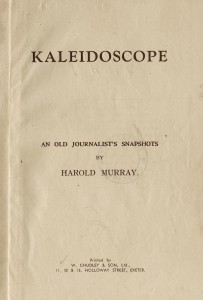 Found in a pile of books here at Jot HQ a battered, library copy ( ‘ with all the stamps ‘, as the abebook dealers say ) from Exeter City Library of Kaleidoscope , an old journalist’s snapshots (Exeter, nd but c 1947) by Harold Murray. Printed in Exeter by W. Chudley & Son, it would seem to be self-published, but unlike most books of this type, it is actually worth reading.
Found in a pile of books here at Jot HQ a battered, library copy ( ‘ with all the stamps ‘, as the abebook dealers say ) from Exeter City Library of Kaleidoscope , an old journalist’s snapshots (Exeter, nd but c 1947) by Harold Murray. Printed in Exeter by W. Chudley & Son, it would seem to be self-published, but unlike most books of this type, it is actually worth reading.
Wikipedia, alas, has no information on Murray. He claimed to be of ‘ Scottish origin’, and was born in an ‘ old parsonage in the Fen country ‘ (possibly near Peterborough). As for his year of birth, recollections of having seen in 1884 a zoetrope at a bazaar and of being a cub reporter at the time of the Boer War, suggests that he first saw the light of day sometime in the eighteen-seventies. As for his published works, abebooks does feature Kaleidoscopealongside the author’s biographies of two nonconformist preachers, Dinsdale T.Young and Campbell Morgan, along with a collection of Murray’s stories for Boys’ Own Paperand a life of the famous evangelist preacher Rodney ‘Gypsy’ Smith (1860 – 1947). The ‘ by the same author ‘ panel in Kaleidoscope suggests that Murray ‘s main interest was religious evangelism, though this doesn’t come across strongly in Kaleidoscope, which is essentially a hotchpotch of anecdotes about all the many famous, and not so famous, people and places he had encountered in his rather hectic career as a jobbing journalist.
It isn’t easy to establish if Murray was attached to particular newspapers for any length of time, if he was a freelance for much of his life, or if he did other things when he wasn’t writing. He seems to have been enchanted by the idea of writing for a living from his earliest days. FromKaleidoscope it seems obvious that he wished to be seen as someone who was, in the words of Wyndham Lewis, ‘ not for sale ‘ and it doesn’t appear that he was ever troubled by the insecurity of the freelancer’s life. At one point he remarks that he liked writing about hotels because, until twenty years ago, he had spent so much of his life living in them. This might suggest that for a while he was married, with a house and perhaps a family, and that a divorce or separation obliged him to return to living in hotels and boarding houses. But it might equally suggest that Murray, like Gipsy Smith, preferred the life of a wanderer from place to place. He certainly got around.
All journalists need to have good memories, but Murray’s was more powerful than most. Kaleidoscopeis a wealth of wonderful anecdotes going back to the 1890s. In fact there are so many that one must be selective. The more interesting recollections from the point of view of the history of popular entertainment relate to music hall and early cinema: Continue reading
